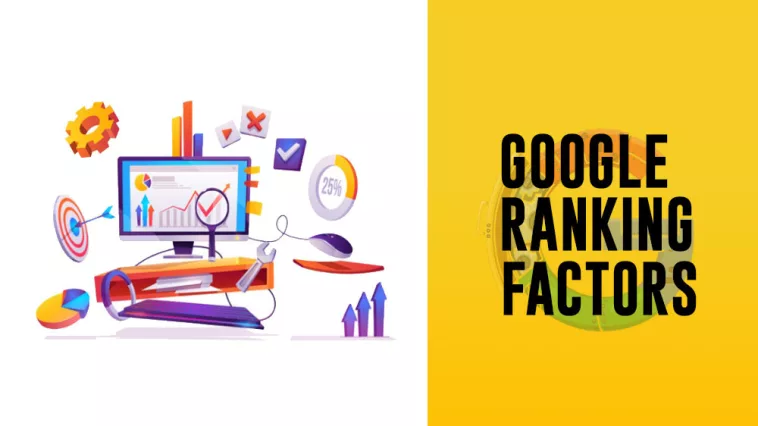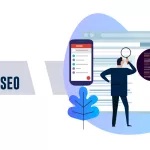Google’s ranking factors are shrouded in mystery.
No one actually knows how Google ranks a website. Although there is speculation among top SEOs that Google could be using over 200 ranking factors to decide which website to rank on top.
As new algorithm updates roll out, it is hard for content creators to keep up with the latest development. But if you want to stay on top of your game as a content creator, you need to know the ranking factors that affect your SERP ranking.
So what are these ranking factors?
Well, Google never officially announced the factors that affect a website’s ranking.
But we have compiled a list of signals that Google probably uses to rank a site.
Some of these are proven and some are controversial.
We know about those ranking factors from –
- Unofficial Announcements
- Official Sources
- Case Studies
- Industry Leading SEOs
- Personal Experience
Google doesn’t just look at one ranking factor. There are several signals Google looks into before ranking a web page.
Here is the list of ranking signals Google uses to rank a site.
Domain-Level Ranking Factors
Your domain is a very important ranking factor. Having a clean domain profile can help you rank higher in Google SERPs.
Here are some domain-level factors that can affect your ranking positively or negatively.
1. Domain Age
Several Google engineers have talked about Domain age and how it affects site ranking multiple times. There is really not much of a difference between an older domain and a new domain.
But older domains have more credibility over the new domain as these domains have established web pages and probably more backlinks.
Also, a new domain has to go through the ‘Google sandbox’ process for a period of six months.
Google usually takes some time to rank web pages of a brand new domain.
2. Exact Match Domain
Exact match domain (also referred to as EMDs) are domain that exactly matches a user’s search query.
These types of domains used to get a lot of free traffic as they used to rank on top of the search page for the exact keyword as the domain name.
However, Google has decided to stop ranking EMDs just for the sake of similar domain names as the search query.
This great hat SEO technique came to an end after Google realized people were paying top money to get such domain names.
3. Keywords In TLDs
Having a keyword in your TLDs used to work like a charm previously. But now it became almost irrelevant.
Although TLDs can be relevant to search intent. If you own an e-commerce site having a .shop TLD can be better than having a .org TLD.
4. Keywords In Domain
Having a keyword in your domain doesn’t give you an edge in terms of ranking. Some digital marketers and SEOs might disagree with this fact.
But Google has made it public that having a keyword in the domain name is not a Google ranking factor.
Although having a keyword in a domain name can help searchers understand better what your website is about and can increase CTR.
5. Domain Registration Length
Google has clearly stated that the domain registration length is a key ranking factor. As most credible domains or legitimate businesses pay for several years in advance for their domain.
Most people who use black hat SEO techniques buy domains for a year and spam those domains with backlinks or illegitimate content that are against Google guidelines.
Having your domain registered for more than 4 years can give you an edge as Google bots look into the registrar details.
Your domain expiration date can be used as a factor in predicting the legitimacy of your domain.
6. Domain History
Domain history is a very important ranking factor. Having a domain that had been corrupted with spammy backlinks or had malicious contents can get your website blacklisted.
These types of domains take can take years to clean their search engine profile.
Domain with a bad history that had volatile ownership or had several drops in recent years might not even show up on search results. This type of domain usually carries the penalty over to the new owner.
7. WhoIs Information
Hiding your WhoIs information might not have a direct effect on your search ranking.
Although sites with suspicious activities that are also hiding their WhoIs information might have some problem. Googler Matt Cutts is quoted as stating:
…When I checked the whois on them, they all had “whois privacy protection service” on them. That’s relatively unusual. …Having whois privacy turned on isn’t automatically bad, but once you get several of these factors all together, you’re often talking about a very different type of webmaster than the fellow who just has a single site or so.”
8. Country TLD extension
Having a ccTLD (country code top-level domain) like our domain (a .uk domain) does actually help with geo-targeting indication. It can help your site rank for a particular country.
But a ccTLD can also limit your global reach and limit your site’s ability to rank in other countries.
Page-Level Factors
Having a web page optimized is very essential to rank on Google. On-page SEO is the most important part of white hat SEO.
Unless you make sure your content is top-notch, there is no point in practicing other SEO techniques.
Here are some page-level ranking factors.
9. Keywords In Title Tag
Having a keyword in the title of your web page is not as important as it used to be.
Once it was a prerequisite to use keywords in the title to help Google bots and users understand what the content of the page is about. But now Google algorithm has become much smarter.
But still, having keywords in the title tag is a good on-page SEO practice. At least it will be easier for searchers to understand what is the topic of our web page.
10. URL Containing Keyword
Having a keyword in your web page URL can give you a ranking boost. Google confirmed that having a keyword in the URL is a ranking factor.
Although it is not needed and it won’t affect your ranking in a big way.
But try to insert your keyword in your URL if it fits the context.
11. Title Tag Starts with Keyword
According to MOZ, having a keyword at the start of your title tag can be beneficial for ranking.
It is better to have your focus keyword at the beginning of the title tag rather than at the end of the title tag or worse not having it at all.
Keywords are very important because help search engines understand what the page is about.
Also, having a keyword in the title tag increases CTR as more people tend to click on a post with a title that matches their search query.
12. Keywords In Description
Using keywords in the meta description can improve your Google search ranking. Some SEOs believe that using keywords in the meta description helps Google bot index the web page properly. Also, it helps the searcher find the relevant result easily.
You might have noticed that when you make a Google search, Google highlights the keywords that you have typed as your search query, in the meta description of all the websites.
If a site doesn’t have that certain keyword in the meta tag, Google shows a ‘missing’ keyword tag on that site.
Although Google said multiple times that they don’t consider meta description as a direct ranking signal.
Even if meta description has nothing to do with your site ranking, it can surely increase CTR.
13. Keywords In H2 Tags
Optimizing the H2 tag is an important part of on-page SEO. Using a keyword in H2 shows the relevancy of your content. Google uses the H2 tag as a ranking factor.
It is a strong ranking signal. So make sure to use the H2 tag properly. DOn’t use any absurd title for the H2 tag. Try to keep it relevant to your content.
14. Keywords In Body Content
Using keywords in the main body of your web page is necessary as it is a relevancy signal for search engines.
A keyword or key phrase should appear multiple times on a web page. Keywords are used to describe the contents of the page to the search engine.
Using keywords multiple times can help improve relevancy and thus improve ranking.
15. TF-IDF
Google uses TF-IDF as a ranking factor for your content. Google focuses on term frequency rather than counting keywords.
It is Google’s way of checking how often does a certain word is repeated on a web page. It is used to find the relevance of a web page to a search query.
16. Content Length
Content length is a very important Google ranking factor. Google loves well-written content that covers specific topics with a wider breadth.
Longer contents rank better in search engines as they seem to cover a specific topic in great detail.
In a recent study, we found that website that usually ranks in the top 10 of Google search results have an average word count of 2,200 words.
Also, longer contents cover a variety of related keywords, so the chance of ranking for various keywords also increases.
17. Unique Content
Google hates duplicate contents or spinning articles. If you want to rank on top of Google SERP make sure you have a uniqueness in your content.
Your content should reflect your own opinion and should have its own voice.
18. Table of Contents
You probably noticed that we use table of contents with all our articles. Having a table of content on your web page can help Google better understand your content.
Also, this is a superb internal linking technique. Using a table of content on your page can get you a sitelink for that specific page.
19. Keyword Density
Keyword density was a very important ranking factor. But now it is no longer a strong ranking signal for Google. But Google may use it to determine the topic of a webpage.
However, over-optimizing your web page with keyword stuffing can hurt your SEO and ranking.
20. LSI keywords
Latent Semantic Indexing keywords are keywords that are relevant to the topic. These types of keywords can help search engines better understand the topic.
Adding LSI keywords in titles, headings or main content can help you rank higher in search engines.
21. Page Loading Speed
Google wants its users to have a better search experience. This is the reason Google gives huge importance to page speed.
Search engine spiders can estimate your site speed fairly accurately based on your page’s HTML code.
Page speed is one of the top-ranking factors and should not be taken lightly. Optimizing your web page to load faster can have a dramatic impact on your ranking.
A quick loading time not only improves user experience but also decreases the bounce rates.
22. Multimedia
Using unique images and videos on your web pages is a quality signal. Google ranks pages higher when they have multiple multimedia files or have embedded content.
Make sure to use unique content and not stock images or videos on your page. We did an experiment where we used a stock image on one page and a unique image on another page.
Both of these pages had the same information. The only difference was that one picture.
After indexing both pages, we saw the page with the unique image was performing better than the one with the stock image.
23. Image Optimization
Optimizing images is a very important part of on-page SEO. Google uses images on a page to understand the relevance of the content.
Using keywords in your image file name and alt text can help Google understand how your image is relevant to the topic.
Optimizing images can help you rank higher in search results or at least for image search results.
24. Fresh Content
Fresh content will always get priority when it comes to ranking. After Google rolled out the Caffeine update, Google search results began to show updated and latest contents on top of SERPs.
Google prefers fresher content over older out-dated content, especially for time-sensitive searches.
25. Updating Older Content
Updating older content will also see a positive impact on search ranking. When you provide additional information to a page that is indexed and well established, you will see a change in search ranking.
But those changes will have to be significant. You can’t just change the date of your article and expect to see changes in your ranking.
Make sure you provide more recent data with your post and provide fresh content. Also, it works better when you add a new image to an existing post when updating it.
26. Use of AMP
Using AMP on your site can have a positive effect on your ranking. Although it is not a direct Google ranking factor and Google never stated that using AMP will improve ranking.
But as AMP helps a site to load faster for mobile devices, it can increase the mobile ranking of a site.
27. Duplicate Content
Having duplicate content on your site can affect your search ranking negatively. This is a black hat SEO strategy that many people used to manipulate search engines and rank easily.
But not having duplicate content can negatively influence a site’s search engine visibility.
28. Outbound Links
You have probably heard this many times from SEO experts that outbound links can increase ranking. This is actually true and it can have some impact on your ranking.
Outbound links are a trust signal for Google. When you link out to other authoritative sites, it adds value to your own content which Google may view positively
But the links themselves are not a ranking factor.
29. Internal Linking
Internal links can have a massive impact on your SEO as well as on your ranking. This is a very important ranking factor.
Internal linking can increase the ranking of a web page if done properly. Having links from related pages of your website can help search engines navigate through the website efficiently.
Internal links also help with faster indexing. Having internal links from a high authority page of your website can help a new page rank faster.
30. Outbound Link Theme
Your outbound link should always be relevant to your own content. Google may use the content of outbound links as a relevancy signal.
31. Search Intent Match
Google always look into if a page content matches a user’s search intent. This is an important ranking factor as it provides more relevant search results.
If a searcher is comparing products online a review page can match the search intent.
32. Rel= Canonical Tag
Using Rel=canonical tag in your site properly might prevent your site from getting penalized for duplicate content issues. This tag specifies search engines to index the ‘preferred’ version of a web page.
33. Grammer & Spelling
Using proper grammar and spelling might give you a slight edge. Although it is not a direct ranking factor. But it is a quality signal and shows the credibility of an article.
34. Content Syndication
Some SEOs might disagree with this but having syndicated content might not be as bad as you might think. But you need to follow some important rules when publishing syndicated content.
Do not just copy content from a web page and publish it as your own. Most contents that you see in search results are some sort of syndicated content. But these contents are not scraped contents.
These contents have their own style of presenting and are not simply copy and paste.
When writing content like this, you can take ideas or inspiration from other content creators but make sure to use your own words and information.
35. Mobile Friendly
In March 2018, Google made a huge announcement that they were going to start with mobile-first indexing.
This means that Google would prefer web pages that load faster on mobile devices. Google decided to go with mobile-first indexing because most searches come from mobile devices.
So Google wants its mobile users to have a better search experience.
Making your content mobile-friendly is a very important ranking factor in 2021 as most of your site visitors will be using mobile devices.
36. Internal Links Pointing to Page
The number of internal links pointing to a page indicates its importance. Internal links show how a page is related to the contents of other pages on the site.
Having more internal links indicates the content is very important.
37. Internal Links From High UR Page
Having internal links from pages with high URL rating can give your new page an instant ranking boost.
Internal links pointed from high authority pages of your website can have a strong effect on low rank pages.
38. Broken Links
Websites with too many broken links can send a bad quality signal to Google. Having broken links indicates that a site is not well maintained. It shows a site is not active or the site is neglected.
Broken links are a direct ranking factor. Sites with too many broken links rank lower on the search engine results page.
39. HTML errors
Lots of HTML errors or sloppy coding may be a sign of a poor quality site.
As Google prefers mobile-first indexing, it is necessary to fix any HTML error in web pages that are indexed.
40. URL Length
Shorter URLs works better than excessively long URLs as it might hurt a page’s search engine visibility. Short URLs containing keywords tend to perform better than longer URLs.
Do not try to stuff excess keywords in your URLs. Try to keep the URL organic.
41. URL Path
Make sure the new post you publish is not buried deep within your website. Content that is harder to navigate has lower page authority and engagement.
Also, search engines index pages faster when they are directly linked from the homepage.
A good SEO practice is to have a newly published post featured on the homepage.
42. Relevant Category
Creating posts in a relevant category is a strong ranking signal. A page that’s part of a closely related category may get a relevancy boost compared to a page that’s filed under an unrelated category.
Suppose you have written a post about ‘best WordPress plugins’. If you have two categories “WordPress” and “SEO” it is better if you add your post to your “WordPress” category instead of “SEO”.
Here “WordPress” is a more relatable category than “SEO” so it will perform better in terms of ranking.
43. Bullets and Numbered Lists
Bullets and numbered lists are another important Google ranking factor. Having a numbered list or bullet points can help break up your content for readers.
It also makes it easier to understand and makes your content more user friendly.
Google gives more priority to pages that contain bullets and numbers.
44. Too Many Outbound Links
Having too many outbound links might clutter your page and make your content disturbing for readers to read. It can distract from your main content and users might redirect from that page.
Site Level Factor
There are some site-level factors that play an important role when it comes to ranking a website.
Most search engines, especially Google prefers websites that are well maintained and have some credibility. Here are some site-level factors that might affect your search engine ranking.
45. Spin Article
There are black-hat SEO communities that used to rely mostly on spin articles. These are articles that have been copied from an already indexed web-page and republished on another site.
Previously, you could outrank the original content using spin articles. If you had enough backlinks, you could rank your spin articles on top of search results.
But now Google has become aware of the fact that people are misusing spin articles and original content creators are being pushed down in search results by black-hat-SEOs.
So Google made a change in their algorithm which penalizes websites that don’t produce content of their own and are using spin articles.
46. Contact Page
Google prefers sites that have an easily accessible contact page.
It is mentioned in Google’s Quality document that Google gives priority to websites that have enough contact information. Although it has nothing to do with web-page ranking directly.
Having a contact page increases credibility and sends a positive quality signal to search engines.
47. Too Many Affiliate Links
Google is not a big fan of Affiliate sites. Many affiliate sites are used to spam users and building backlinks. Typically affiliate sites have spinning articles and are of low-quality.
If you have an affiliate site, make sure to follow all the guidelines. Do not fill your web-pages with affiliate links and force it on your visitors.
Also, make sure to no-follow-all your affiliate links.
48. Interstitial Ads
Interstitial Ads are pop up ads that force a user to view an ad before seeing the content. This can be very disturbing for website visitors and the bounce rate is much higher for these types of sites.
These ads can appear before the page loads, when the page loads, or when a user scrolls.
Because of the bad user experience, Google avoids ranking websites that show interstitial ads.
49. Domain Trust/TrustRank
“TrustRank” is a direct ranking factor according to Google. Many SEOs believe that “Trust Rank” is a very important ranking factor that is often overlooked.
Domains with high trust rank tend to rank higher in search results. Also, trusted domains are indexed frequently.
You can increase domain trust by acquiring backlinks from other trusted websites.
50. Privacy Policy & Terms
You must have a privacy policy and terms and conditions page on your website. This is a Google guidelines requirement to improve the transparency of your site.
Make sure you don’t hide any additional information on your privacy page.
Also, if you are using Adsense with your website, make sure to mention on your privacy page that you are using cookies on your site.
51. About Us
Although having an “About us” has nothing to do with site ranking, it is better to have an About us page.
A well-written description of your website or your company can help your visitor to get to know your company and build trust.





